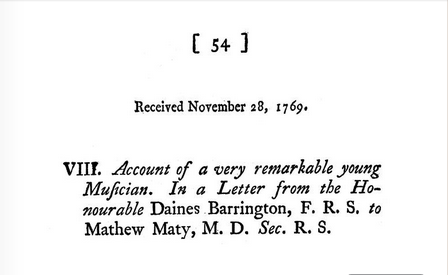A Converted Skeptic's Report on a Visit to 8-Year-Old Mozart
The Vault is Slate's history blog. Like us on Facebook, follow us on Twitter @slatevault, and find us on Tumblr. Find out more about what this space is all about here.
In this letter, read before the British scientists of the Royal Society on Feb. 15, 1770, the lawyer, naturalist, and fellow of the Society Daines Barrington described his 1764 visit with an 8-year-old Wolfgang Amadeus Mozart.
During the young musician’s year-long London trip, Mozart stayed in the city with his family. Londoners were fascinated by his talent, which he displayed in public concerts and in private audiences with King George III and Queen Charlotte.
Barrington took a totally new score with him when he visited the Mozart lodgings. This was a manuscript only recently composed, so that he could be sure that Mozart could not have seen it previously. The boy’s sight-reading performance was “masterly,” and surpassed that of his accompanying father, who faltered once or twice; “on which occasions the son looked back with some anger, pointing out to him his mistakes, and setting him right.”
The lawyer then asked the boy to compose extemporaneously, asking him for a love song and a “song of rage,” “such as might be appropriate for an opera stage.” Both results “showed most extraordinary readiness of invention.” The “Song of Rage” provoked the prodigy to heights of emotion: “He had worked himself up to such a pitch, that he beat his harpsichord like a person possessed, rising sometimes in his chair.”
Barrington did research to verify Mozart’s age, including on the second page of this report an affidavit from the registrar in Salzburg, the boy’s birthplace in present-day Austria.
The lawyer also added several anecdotal reports of childlike behavior to buttress this evidence. While Mozart was playing, for example, “a favorite cat came in, upon which he immediately left his harpsichord, nor could we bring him back for a considerable time.” “He would also,” Barrington added, “sometimes run about the room with a stick between his legs by way of horse.”
I first saw this document, which is collected in the Internet Archive, on the Public Domain Review.
Update, Dec. 17, 2013: This post has been updated to clarify that when Mozart was born, Salzburg was not part of Austria.

